Gales code
Gales is a Finite Element code written with meta-template C++ programming language and parallelized using OpenMPI. The software design is intended for high-performance computing and utilization of distributed memory architecture of a computer cluster. The software uses features of Boost C++ and Trilinos libraries.
The code is being actively developed to support execution on GPU architectures.
Gales is made of several modules for the solution of:
- Single fluid
- Multi fluid
- Elastostatic
- Elastodynamic
- Heat equation
- Advection-diffusion
- Fluid Structure Interaction
- Stokes flow
- Thermoelasticity
- Mesh motion

Single fluid – fluid_sc solver
The Fluid_SC solver addresses single-component fluid flow problems for both compressible and incompressible regimes. It employs SUPG stabilized finite element method (FEM) and Discontinuity Capturing (DC) framework to ensure numerical robustness and accuracy. The solver uses a monolithic approach, solving velocity, pressure, and Temperature fields simultaneously to improve convergence. It is well-suited for simulating laminar flows in complex geometries. Stabilization techniques mitigate numerical instabilities commonly encountered in advection-dominated flows. Fluid_SC supports steady-state and transient simulations with fixed and adaptive time-stepping using implicit approach. Its flexible formulation allows integration with structural solvers for fluid-structure interaction (FSI) problems. The solver is optimized for parallel computing environments to handle large-scale simulations efficiently. Fluid_SC forms a foundational tool for HPC single-fluid flow modeling of various engineering and natural science applications.
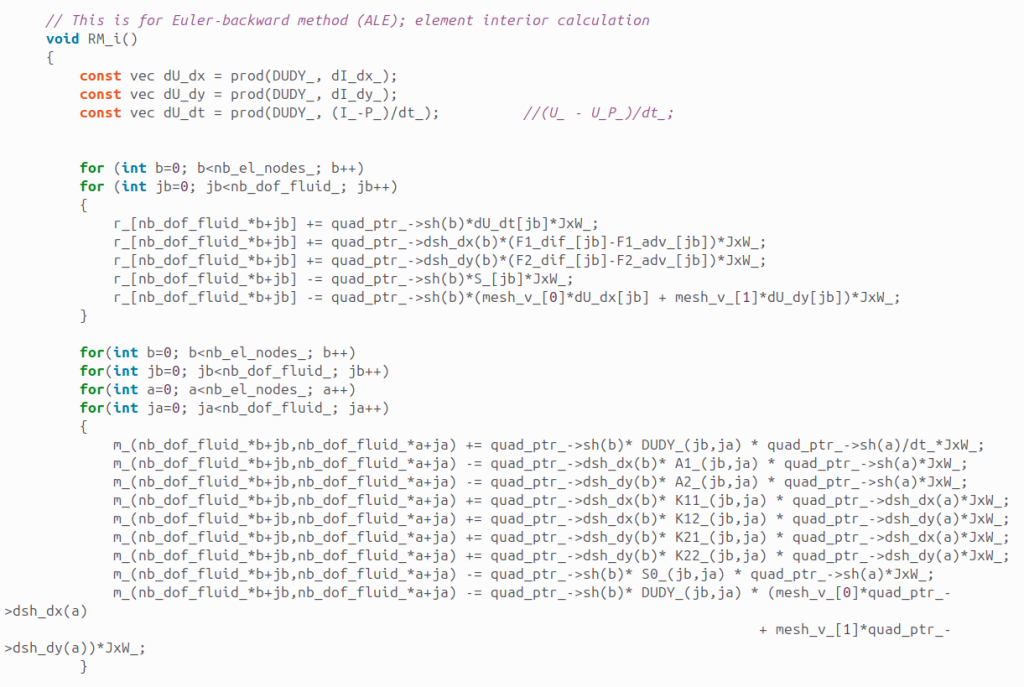
Multi fluid – fluid_mc solver

The Fluid_MC solver is specialized for multifluid flow systems involving multiple immiscible or miscible fluid components. It extends the stabilized finite element framework to capture interfacial dynamics and multiphase interactions accurately. The solver solves for pressure, velocity, temperature, and mass fraction of components. It handles compressible and incompressible flow regimes with phase change and mass transfer capabilities. Fluid_MC employs a monolithic scheme to solve coupled governing equations simultaneously, improving stability and computational efficiency. The employed interface capturing technique can maintain a sharp interface. It supports transient simulations with robust time integration. The solver is designed for applications in multiphase flow reactors, oil-water separation, and atmospheric science. Fluid_MC’s scalable parallel implementation enables the simulation of industrial-scale multifluid systems. Its modular architecture facilitates coupling with structural and thermal solvers. Fluid_MC provides a comprehensive toolset for complex multiphase flow modeling.
Elastostatic – solid_es solver
The Solid_ES solver focuses on static analysis, solving elasticity problems within a finite element framework. It supports linear elasticity model to simulate material deformation under static loads. The solver accommodates isotropic material behaviors with customizable constitutive laws. Its formulation enables efficient computation of stress, strain, and displacement fields across complex geometries. Solid_ES delivers reliable and precise elasticity solutions for advanced engineering analyses.
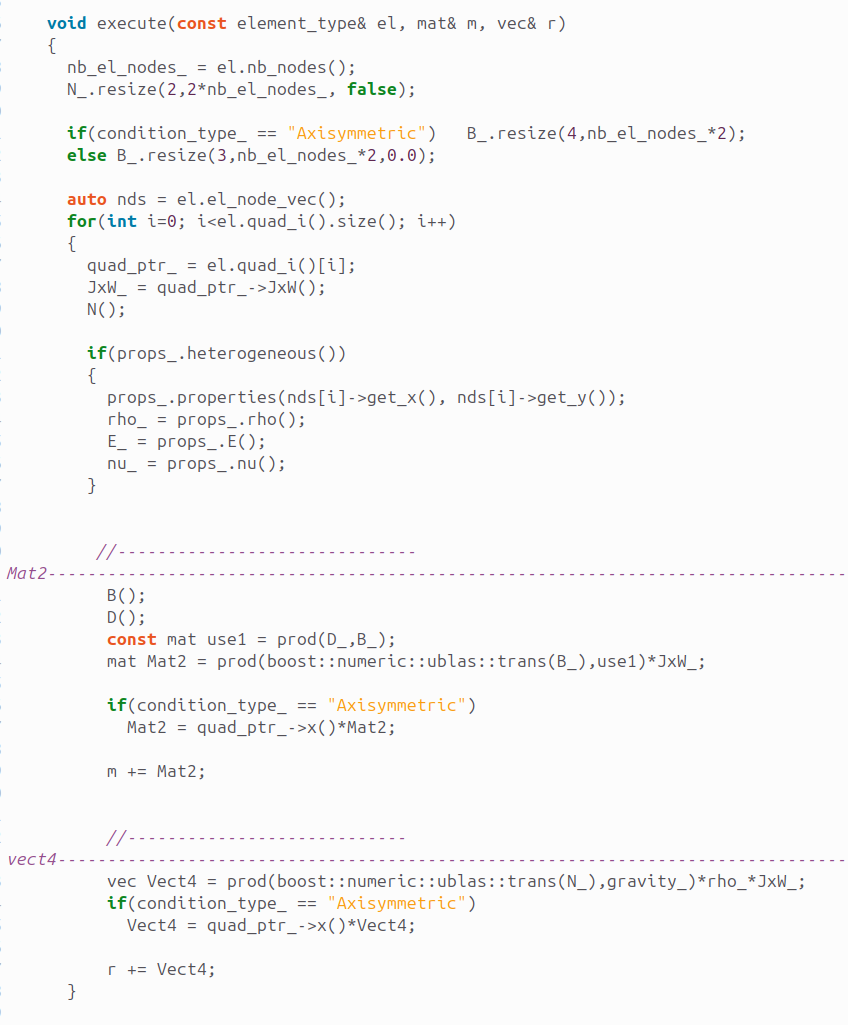
Elastodynamic – solid_ed solver
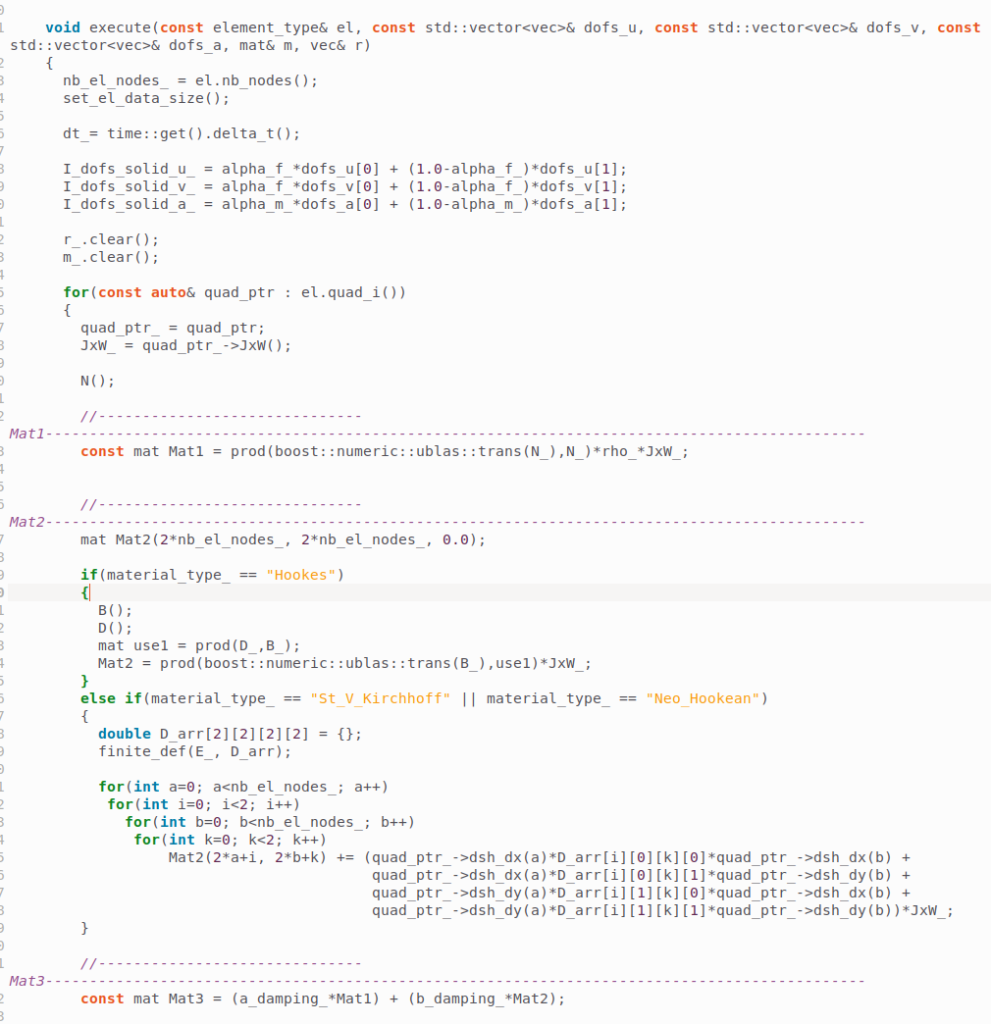
The Solid_ED solver is dedicated to dynamic analysis of elastic and hyperelastic materials within a finite element framework. It supports advanced constitutive models to accurately capture nonlinear material behavior, including large strains and complex stress–strain relationships. The solver employs implicit time integration schemes for stable and efficient transient simulations. Solid_ED can model isotropic hyperelasticity, suitable for rubber-like materials and biological tissues. It accounts for geometric nonlinearities and inertia effects in dynamic loading scenarios. The solver is designed for simulations of solid and structural response under impact, vibration, and cyclic loads. Seamless coupling with fluid solvers enables comprehensive fluid-structure interaction (FSI) analyses. Parallel computing capabilities ensure scalability for large-scale, high-resolution problems. Typical applications include soft material mechanics, biomechanics, and elastomeric component design. Solid_ED provides a robust platform for linear and nonlinear dynamic structural simulations involving complex material behavior.
Heat equation – heat_convection solver
The Heat_Equation solver addresses transient and steady-state heat transfer problems using a stabilized finite element method. It can solve the governing thermal conduction equation with variable thermal properties. The solver supports conduction and internal heat generation modeling within complex geometries. Implicit time integration schemes ensure numerical stability for transient thermal simulations. It accommodates nonlinear temperature-dependent material behavior and boundary conditions. The solver can be coupled with fluid and structural solvers for conjugate heat transfer and thermoelastic analyses. Parallel processing capabilities enable efficient computation of large-scale thermal problems. Heat_Equation is suitable for applications in electronics cooling, aerospace thermal management, and energy systems. It provides accurate and robust thermal analysis for engineering and research purposes
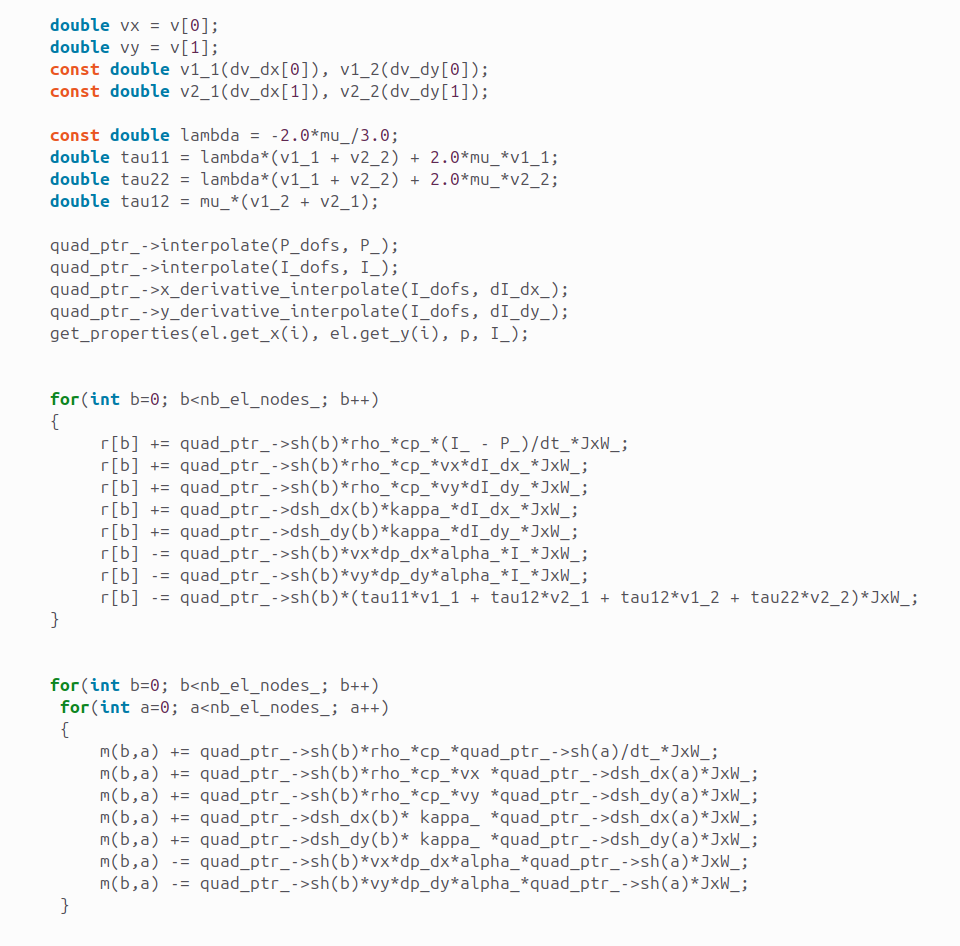
Advection-diffusion – adv_diff solver
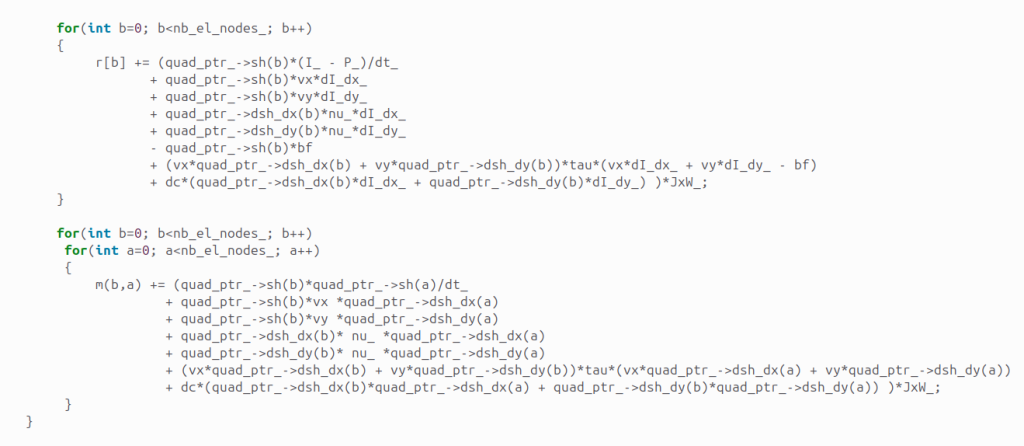
The Advection-Diffusion Equation solver models the transport and dispersion of scalar quantities such as temperature, concentration, or pollutants. It employs a stabilized finite element method to accurately capture advection-dominated and diffusion-dominated regimes. The solver handles steady-state and transient problems with variable advection velocities and diffusion coefficients. Implicit time integration schemes enhance numerical stability in transient simulations. It supports complex boundary conditions including inflow and outflow. The solver is designed to couple seamlessly with fluid solvers for scalar transport in fluid flows. Parallel computing compatibility allows efficient simulation of large-scale environmental and engineering transport phenomena. Applications include contaminant dispersion, heat transfer with convection, and chemical species transport. The solver’s modular architecture facilitates integration with multiphysics frameworks. It provides a reliable tool for detailed scalar transport modeling in complex systems.
Fluid Structure Interaction – fsi/sc_ed, fsi/mc_ed
The FSI solver employs a segregated algorithm to couple fluid, mesh motion, and solid solvers for comprehensive fluid-structure interaction analysis. It uses boundary condition-based data exchange at the fluid-structure interface to ensure accurate load and displacement transfer. The modular framework allows coupling with any compatible fluid solver, mesh motion solver, and structural solver. The segregated approach improves computational efficiency by solving fluid and solid domains separately while maintaining tight coupling. It supports transient simulations capturing dynamic interactions such as flutter, vortex-induced vibrations, and structural deformation. Mesh motion is handled using advanced mesh deformation techniques to maintain mesh quality during large structural displacements. Parallel processing capabilities enable scalable simulations of complex multi-physics problems. The solver is suitable for aerospace, automotive, and civil engineering applications where fluid-structure coupling is critical. It facilitates robust, flexible, and accurate modeling of coupled fluid and structural systems. FSI enhances predictive capabilities for design and safety evaluations in multidisciplinary environments.
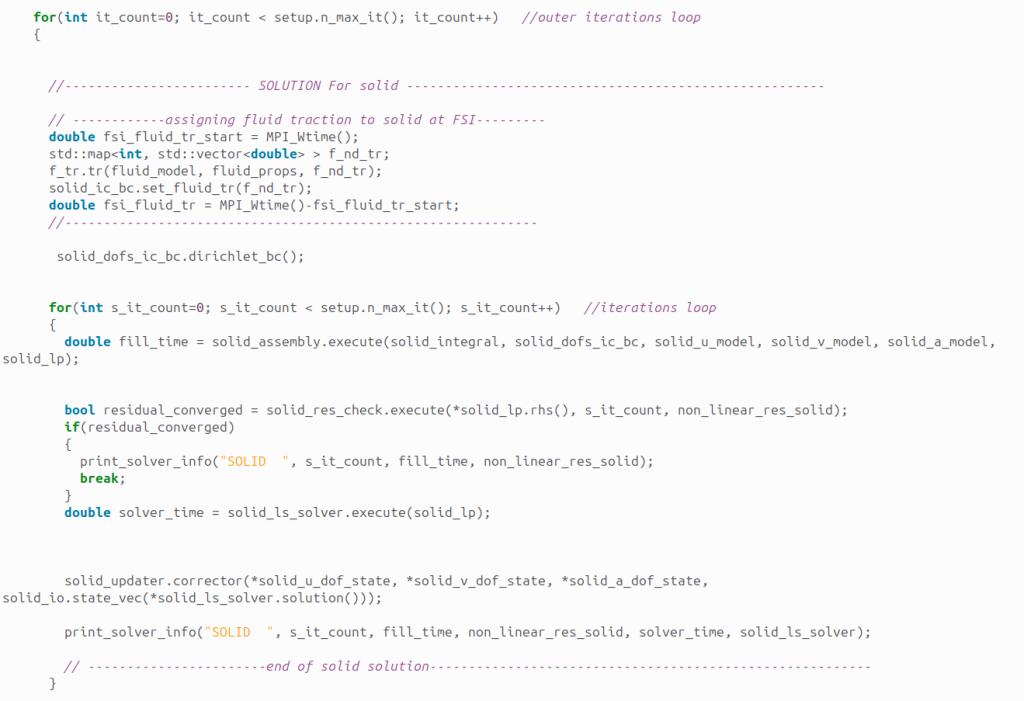
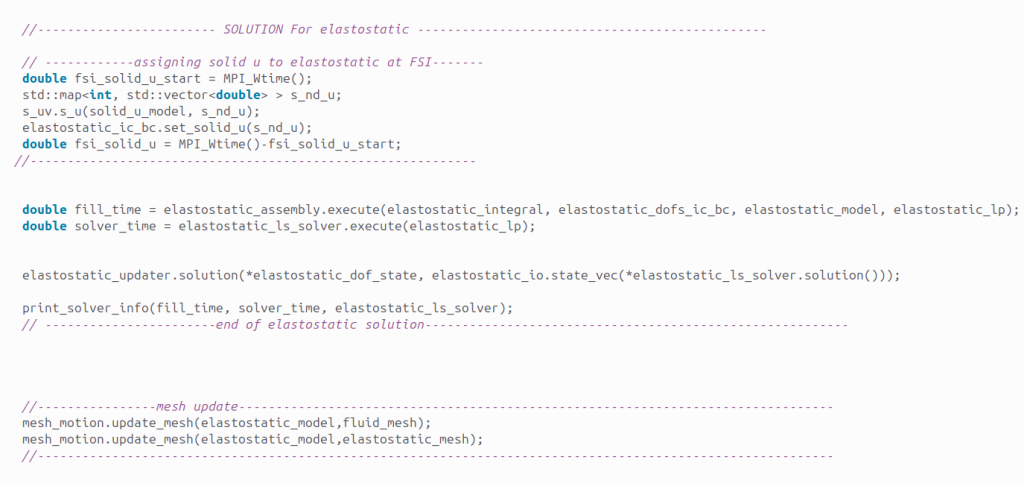
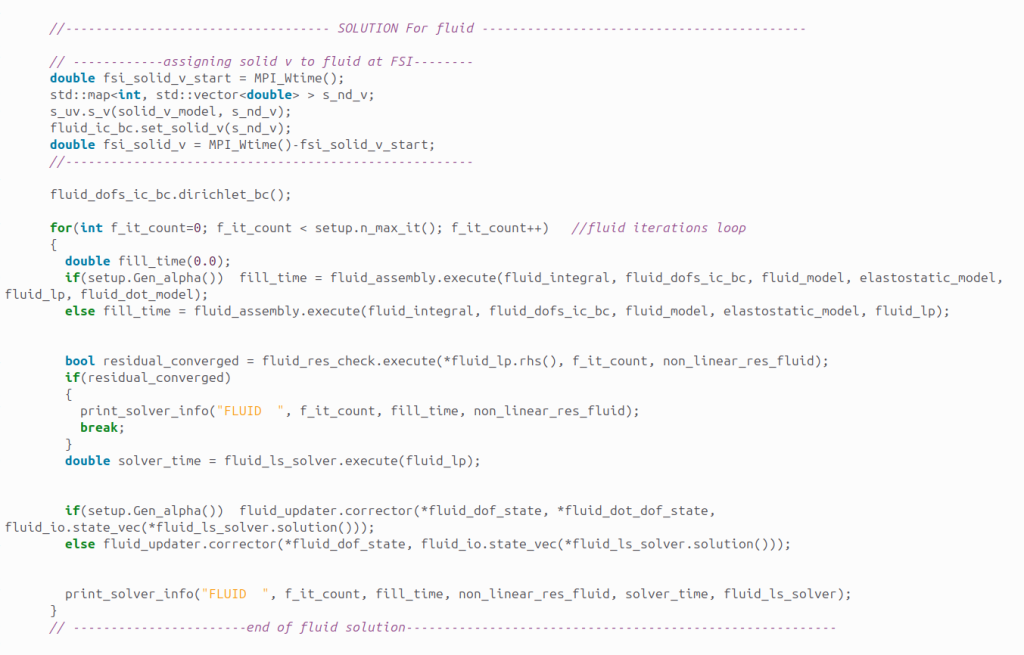
Stokes flow – stokes_flow solver
The Stokes Flow solver specializes in simulating viscous, incompressible-weakly compressible, low-Reynolds-number flows where inertial effects are negligible. It solves the linearized Navier-Stokes equations using a stabilized finite element method to ensure numerical accuracy and stability. The solver efficiently handles complex geometries and boundary conditions, including no-slip, slip, and pressure-driven flows. It supports both two- and three-dimensional simulations. The solver is particularly suited for microfluidics, lubrication, and slow viscous flow applications. Implicit solution strategies enable robust convergence for steady-state problems. Integration with mesh motion and solid solvers facilitates multiphysics coupling in fluid-structure interaction studies. Parallel computation capabilities allow scalable performance for large problem domains. The Stokes Flow solver provides a reliable framework for detailed analysis of creeping flow phenomena. It is an essential tool for researchers and engineers working with slow, viscous fluid systems.
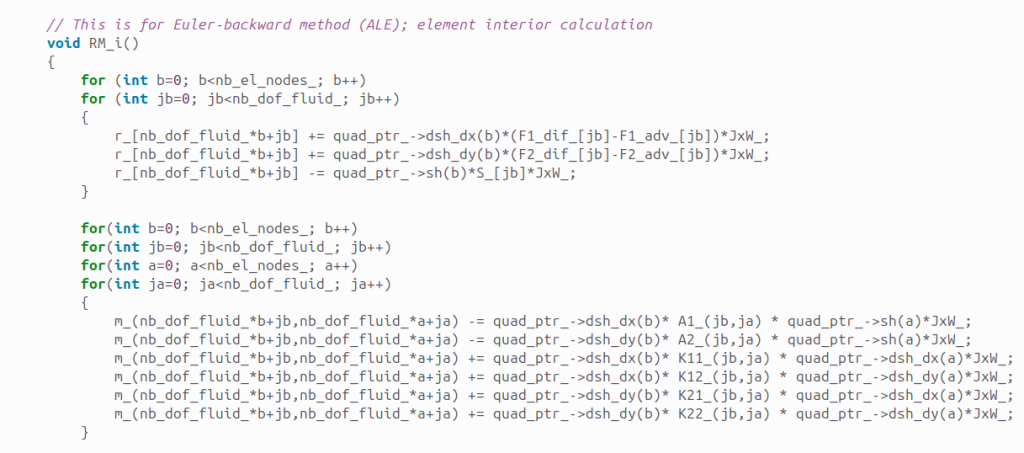
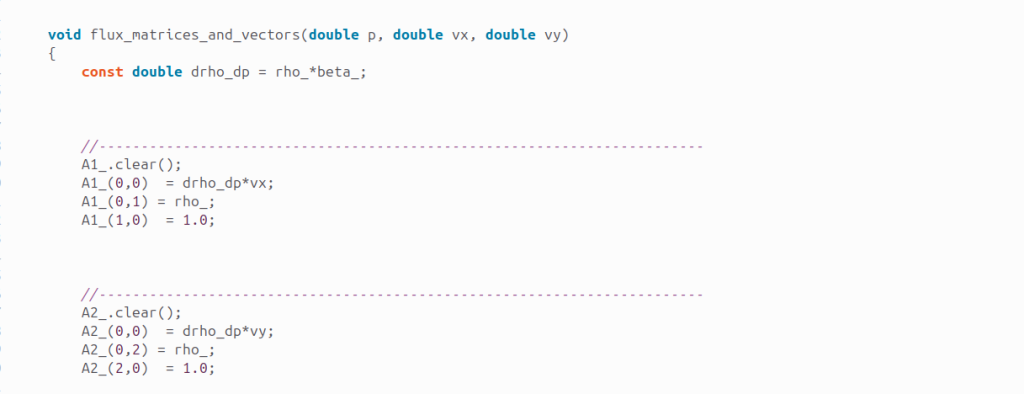
Thermoelasticity – thermoelasticity solver
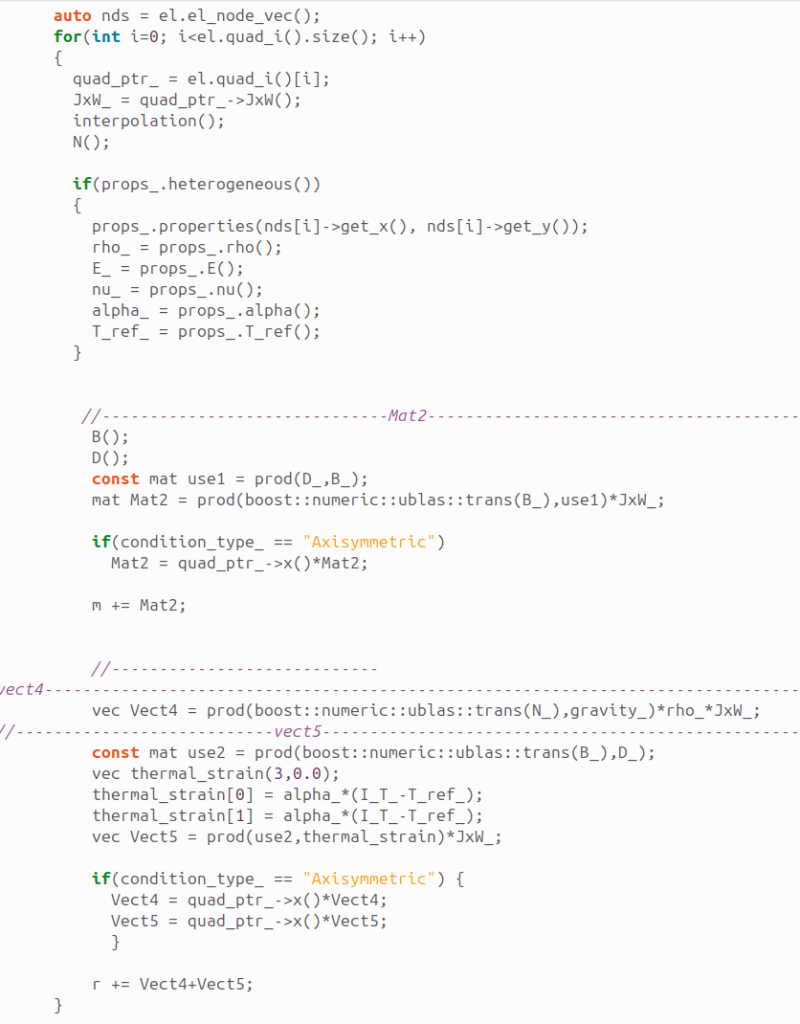
The Thermoelastic solver addresses coupled thermal and mechanical behavior in solid materials using a finite element framework. It solves the governing equations of elasticity alongside heat conduction to capture thermal stresses and deformations. The solver supports both steady-state and transient analyses, incorporating temperature-dependent material properties and nonlinear effects. It accurately models thermal expansion, heat-induced stresses, and temperature gradients within complex geometries. Implicit time integration schemes ensure stable simulations of dynamic thermo-mechanical interactions. The solver integrates seamlessly with fluid and structural solvers for multiphysics coupling, including fluid-structure-thermal interaction. Parallel processing capabilities enable efficient large-scale computations. Typical applications include aerospace component design, electronic device cooling, and structural integrity assessment under thermal loads. The Thermoelastic solver provides robust, analysis of coupled thermal-mechanical phenomena. It is essential for predicting performance and reliability in thermally stressed structures.
Proudly powered by WordPress
